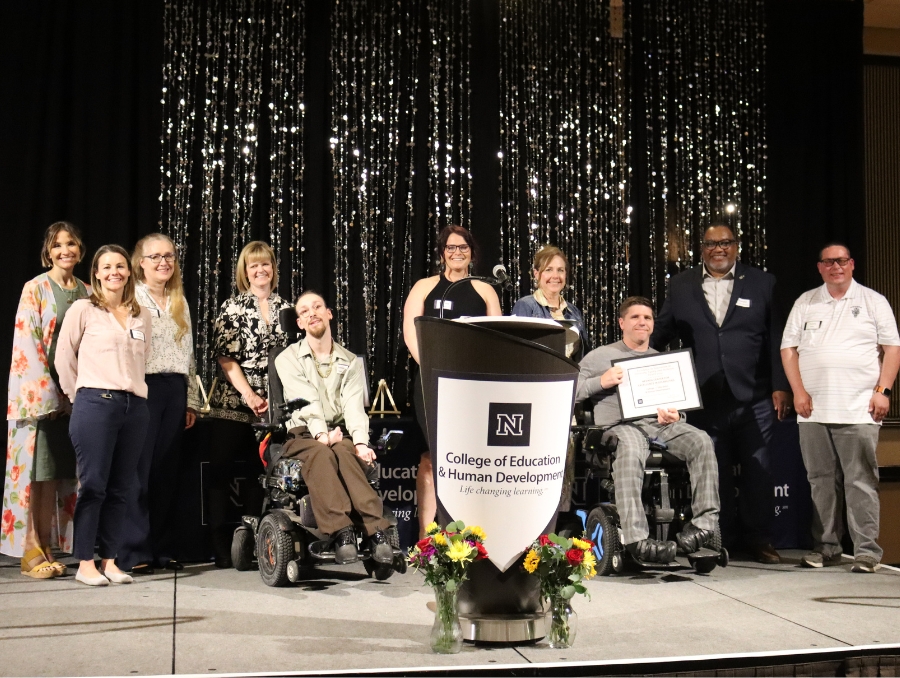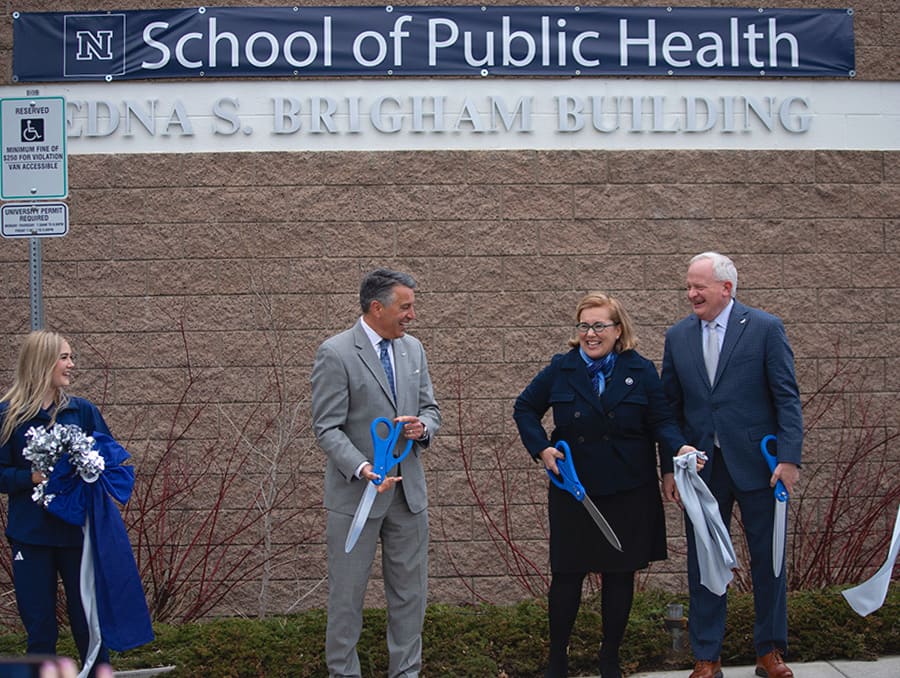From the beginning of his hour-long presentation to representatives of the Staff Employees Council on Tuesday in the Reynolds School of Journalism, University President Milt Glick eschewed his Blackberry almost entirely, kept the slides in his PowerPoint presentation to a minimum, and made more than a few veiled references to his favorite cottage industry — the 3-inch by 4-inch index card business.
"I've been known to have a 165-slide presentation, but we're only going to do about 40 slides today," Glick said, opting to intersperse hard data with some of his own observations — some soft, some a bit harder — about the campus that he has grown increasingly more familiar with since he took over as Nevada's 15th chief executive in August.
Glick's message was straightforward to those gathered in the Melton Room: "Universities run on myths. Our whole future is run on words. I hope that people will say that we're a myth trying to become a reality. If we say we are about learning and excitement and living and life, that will become our reality."
In piecing together the myth and reality of this institution, Glick said he has come to a few important conclusions. Interestingly, he said, most of the conclusions can be framed rather easily – within the confines of a 3-inch by 4-inch index card.
"If it doesn't fit onto an index card," he said to the group, smiling, "then the odds are good I probably won't remember it."
His grin growing, Glick confided that his next job would probably be in the index card industry.
"If I ever do retire… and I do believe retirement is a social disease… I will go into the business of creating 3 by 4 cards," he said. "You can only buy 3 by 5 index cards at Office Max, but a 3 by 5 won't fit into my pocket. So for $1 they can take off an inch. If I could go into that business in retirement and market those 3 by 4 cards that I love so much, I would be a wealthy guy."
It was that type of afternoon talk. Glick was at times very serious, serious, semi-serious and not serious at all. It made for an interesting presentation, one that drew several interesting observations and ideas from members of SEC — one of the campus' most influential governing bodies.
Glick noted that the University has a $176 million budget, which, including cost of living adjustments, fringe, merit and new space comes to a base budget of about $186 million. He said the number is somewhat deceiving, as the state's formula funding for the institution stands at about 85 percent.
In order for the University to avoid a potential shortfall that could amount to several million dollars, he said the campus would have to add 300 full-time students.
"We could recruit 300 students," he said, "but an even better thing would be to retain 300 students. We have too many students who leave us."
He said that expectations of current students can and should increase, noting that national studies have shown that students who take more credit hours — more than the typical 12 credits — experience better academic success than those who are only asked to maintain a minimal course load.
"If our students took more hours, they would succeed," Glick said. "The more (credits) you sign up for, the better you do. But this is not part of the mythology of the campus. And this isn't just a UNR phenomenon — it's a national phenomenon."
Glick also said part of Nevada's story is intertwined with aspirational peers. He said the institution should find a cohort that fits Nevada's goals and work to better understand what it will take for this University to find its place in that group.
He said a natural group would be what he called "The Six Pac – (PAC 10, No Cal)," meaning Pacific 10 schools Arizona, Arizona State, Washington, Washington State, Oregon and Oregon State. University of California schools such as UC-Berkeley and UCLA would be excluded because they are significantly larger, and private institutions USC and Stanford would also not be included.
"It would be a stretch for us," he said of the "Six Pac."
"But," he added, "It would be a stretch worth doing."
Currently, Nevada would rank seventh in the "Six Pac" based on revenues, tuition and fees. However, Glick said, Nevada's ranking would improve dramatically based on percentage of budget that the institution receives from state funding sources. At 37.1 percent, Nevada would rank first in this category in the "Six Pac."
"So we're not in a very strong position to whine," Glick said. "The frustrating part is we have low tuition, but we're not affordable. We need to find ways to make this institution more affordable for students who truly need financial aid."
Glick then answered a question that no doubt many of the Staff Employees Council was thinking: "Would I ever raise our tuition? Well, if I can promise our students that they will get more for their money (in terms of financial aid, scholarships and other enticements to bring more opportunity and diversity to campus), then yes, I would think about raising tuition."
During a segment Glick called "Strategic Planning Lite," he outlined why he felt classified staff play such a crucial role on the campus.
"You really are the front door for many of our students," he said. "I really think it's the classified staff the student seeks out with, "Can you please help me?'"
To demonstrate his point, Glick used cable television as an example. He noted that often customer service will mean a caller will be forced to stumble through an automated maze of reciting name, social security number, password, etcetera, and other personal information before finally making contact with a human being who can address that particular problem.
At that moment, Glick's ever-present Blackberry went off.
"Maybe that's (the cable company) calling you right now," noted SEC representative Scott Brown, his quick comment drawing laughter from the rest of the council.
Without missing a beat, Glick nodded and added, to more widespread laughter, "More likely it's (their) attorney calling."
The point, Glick said, was to always remember why individuals choose to work on a college campus: "It's the difference between a man who says of his job, "I'm laying bricks,' and the man who says, "I'm building a cathedral.'"
"I will obsess enough about these things for the whole campus," Glick added. "But it really doesn't help if I obsess a lot and you don't obsess a little."
Bill Oberding, chair of SEC, asked Glick how the University's graduation rate could improve.
"The kids I talk to say they do like the experience, that they do like the place," Glick said. "They also say it's close and it's cheap. But people who say that don't always say, as they might at a Michigan or a Berkeley, "Gosh, I'm at the foot of the mountain and now I've got to climb it.' A lot of it is attitudinal.
"In some cases, we need to make our students aware of the economics of the situation. Taking an extra year to graduate takes $28,000 out of your pocket. It's like the difference between being a high school graduate and a college graduate — they estimate that it can mean a $1 million difference in income in a person's lifetime. Our message should be, "For $10,000 a year in tuition, you can buy $1 million. Delay a year from graduating, and it takes $28,000 away. Delay two years, and it takes $56,000 away."
Bill Borges, a longtime member of the Facilities and Operations division, noted that another possible retention strategy would be to offer better-paying and more on-campus jobs for students.
"Why don't we pay the students more, give them more jobs on campus and, at the same time, we can mentor the students," Borges said. "There's a huge labor pool we can use."
"I absolutely agree," Glick said. "We know students who work on campus are more likely to succeed and to graduate. If we can find the money to offer them a competitive wage, they add value to the campus. I think you're right on target."
Christine Arritt, SEC secretary, noted that in her own experience as an undergraduate at Southern Oregon College (now University) in Ashland, Ore., on-campus life was a strong magnet for her and her fellow students. She said it enriched her college experience, and practically ensured that she and her friends graduated in four years.
"It definitely contributed to our attachment to the campus," Arritt said, noting lectures that she attended from scientific luminaries such as legendary Nobel chemist and peace activist Linus Pauling, as well as music concerts and other social events.
"I think the new student union will help a great deal," Glick said of the Joe Crowley Student Union, which is scheduled to open next semester. "For our students, the campus needs to become a place where they say, "This is where our life is; we just go home to sleep.'"
Glick said that he remains convinced that Nevada isn't broken, and that all of the efforts in the years preceding his presidency have been productive. The future for Nevada, he said, is bright.
"If I didn't think this was a good place, a place that had done well and wanted to get better, I wouldn't have come here," he said.











